ISC (Science)
Academic Year: 2023-2024
Date & Time: 15th March 2024, 2:00 pm
Duration: 3h
Advertisements
- Candidates are allowed an additional 15 minutes for only reading the paper.
- They must NOT start writing during this time.
- This paper is divided into four sections A, B, C and D.
- Answer all questions.
- Section A consists of one question having sub-parts of one mark/two marks each.
- Section B consists of seven questions of two marks each.
- Section C consists of seven questions of three marks each and
- Section D consists of three questions of five marks each.
- Internal choices have been provided in one question each in Section B, Section C and Section D.
- The intended marks for questions or parts of questions are given in brackets [ ].
In human plasma, five different types of immunoglobulins are found.
Which type of immunoglobulin is responsible for allergic reactions?
Chapter: [0.031] Human Health and Diseases
Some orchids live on the branches of mango trees. Name the type of interaction that exists between the mango tree and the orchid.
Chapter: [0.051] Organisms and Populations
Four triplet codons code for the amino acid valine. Three of them are given below.
GUU GUC GUA
Write the fourth codon.
Chapter: [0.021] Principles of Inheritance and Variation
A haemophilic man marries a carrier woman and they have a daughter. What is the probability of their daughter being haemophilic?
Chapter: [0.021] Principles of Inheritance and Variation
Home-made fruit juices are turbid, while the bottled ,fruit juices purchased from the market are clear. Give a reason for this difference.
Chapter: [0.033] Microbes in Human Welfare
The number of lily plants in a pond was found to be 50. After one year, the number. increased to 65. Calculate the natality of lily plants.
Chapter: [0.051] Organisms and Populations
Based on the table given below, identify the type of natural selection taking place.
| Size of the seeds | % of germination |
| Small | 75% |
| Medium | 15% |
| Large | 75% |
Chapter: [0.052000000000000005] Ecosystem
Give the name of the target pest of gene cry 1 Ac.
Chapter: [0.040999999999999995] Biotechnology - Principles and Processes
If a person shows the production of interferons in his body, then he is suffering from ______.
Malaria
Ring worm
Dengue
Typhoid
Chapter: [0.031] Human Health and Diseases
Match the columns I and II with reference to weeks of pregnancy and the development of a human embryo. Select the correct option from the choices given below:
| Column I | Column II | ||
| I. | 8 weeks | (P) | Limbs and external genital organs |
| II. | 12 weeks | (Q) | Limbs and digits develop. |
| III. | 20 weeks | (R) | Body hair develops. |
| IV. | 24 weeks | (S) | Eyelids separate. |
I - (P), II - (Q), III - (R), IV - (S)
I - (Q), II - (P), III - (R), IV - (S)
I - (R), II - (S), III - (P), IV - (Q)
I - (S), II - (R), III - (Q), IV - (P)
Chapter: [0.013000000000000001] Human Reproduction
Assertion: In a bioreactor, it is not necessary to maintain sterile ambience.
Reason: Sterile conditions promote the growth of unwanted microbes in the culture medium.
Both Assertion and Reason are true, and Reason is the correct explanation for Assertion.
Both Assertion and Reason are true, but Reason is not the correct explanation for Assertion.
Assertion is true and Reason is false.
Both Assertion and Reason are false.
Chapter: [0.040999999999999995] Biotechnology - Principles and Processes
Assertion: Lymphocytes originate and proliferate in primary lymphoid organs.
Reason: Spleen is a secondary lymphoid organ.
Both Assertion and Reason are true and Reason is the correct explanation for Assertion.
Both Assertion and Reason are true, but Reason is not the correct explanation for Assertion.
Assertion is true and Reason is false.
Both Assertion and Reason are false.
Chapter: [0.031] Human Health and Diseases
The equipment shown below is used for the separation of DNA fragments.

Name the chemical used to visualise the movement of DNA fragments in the gel.
Chapter: [0.052000000000000005] Ecosystem
In humans, somatic gene therapy was carried out to correct an immunodeficiency disease. Name this disease.
Chapter: [0.042] Biotechnology and Its Applications
The pedigree chart given below represents the pattern of inheritance of thalassemia in a family.
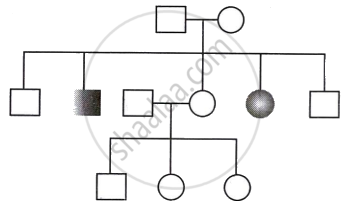
What could be the genotype of the affected male?
Chapter: [0.021] Principles of Inheritance and Variation
In a karyotype analysis, X and Y chromosomes represent sex chromosomes.
Name the scientist who discovered the X chromosome.
Chapter: [0.021] Principles of Inheritance and Variation
The following is well-known abbreviation, which have been used in this chapter. Expand to its full form:
NACO
Chapter: [0.013999999999999999] Reproductive Health [0.031] Human Health and Diseases
The figure given below shows the early stage of the development of microsporangium.
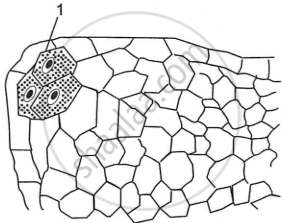
Name the hypodermal cell labelled '1' which divides periclinally.
Chapter: [0.012] Sexual Reproduction in Flowering Plants
Advertisements
Give a reason for the following:
The second half of the menstrual cycle is called the luteal phase as well as the secretory phase.
Chapter: [0.013000000000000001] Human Reproduction
Give a reason for the following:
Streptokinase is administered to the patients having myocardial infarction.
Chapter: [0.042] Biotechnology and Its Applications
Name any two Cu-ions releasing IUDs.
Chapter: [0.013999999999999999] Reproductive Health
Explain any two ways by which IUDs devices act as contraceptives.
Chapter: [0.013999999999999999] Reproductive Health
A population of 200 fruit flies is in Hardy Weinberg equilibrium. The frequency of the allele (a) 0.4. Calculate the following:
Frequency of the allele (A).
Chapter: [0.023] Evolution
A population of 200 fruit flies is in Hardy Weinberg equilibrium. The frequency of the allele (a) 0.4. Calculate the following:
The number of homozygous dominant fruit flies.
Chapter: [0.023] Evolution
A population of 200 fruit flies is in Hardy Weinberg equilibrium. The frequency of the allele (a) 0.4. Calculate the following:
The number of homozygous recessive fruit flies.
Chapter: [0.023] Evolution
A population of 200 fruit flies is in Hardy Weinberg equilibrium. The frequency of the allele (a) 0.4. Calculate the following:
The number of carrier fruit flies.
Chapter: [0.023] Evolution
Jacob is genetically a carrier of the disorder that affects the shape of the RBCs, as shown in the diagram below. His son James suffers from the same disorder.
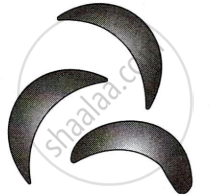
- Give the biochemical reason for the disorder that changes the shape of the RBCs, as shown above.
- Draw a Punnett square to show the genotype of the mother of James.
- Name and define the type of 'point mutation' responsible for this disorder.
Chapter: [0.021] Principles of Inheritance and Variation
The diagram given below shows the three types of endosperms in angiosperms.
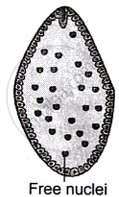 |
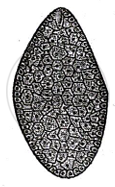 |
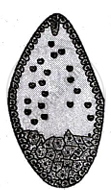 |
| Type 1 | Type 2 | Type 3 |
- Identify the three types of endosperms shown above.
- Name the type of endosperm which commonly occurs in polypetalous dicots.
Chapter: [0.012] Sexual Reproduction in Flowering Plants
The diagram given below shows the various steps in spermatogenesis.
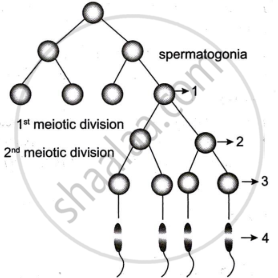
- Name the parts labelled '1', '2' and '3'.
- Name the process by which part '3' changes to part '4'.
Chapter: [0.013000000000000001] Human Reproduction
Write the scientific name of the filarial worm that causes filariasis.
Chapter: [0.031] Human Health and Diseases
Write the mode of transmission for the following diseases:
Filariasis
Chapter: [0.031] Human Health and Diseases
Write the scientific name of the causative agent of the following diseases:
Typhoid
Chapter: [0.031] Human Health and Diseases
Write the mode of transmission for the following diseases:
Typhoid
Chapter: [0.031] Human Health and Diseases
A male plant bearing red flowers was crossed with a female plant bearing yellow flowers. In the F1 generation, all the flowers were orange in colour.
Give a reason to explain the change of colours in F1 generation.
Chapter: [0.012] Sexual Reproduction in Flowering Plants
A male plant bearing red flowers was crossed with a female plant bearing yellow flowers. In the F1 generation, all the flowers were orange in colour.
Mention the ratio of red flowers, yellow flowers and orange flowers in the F2 generation.
Chapter: [0.021] Principles of Inheritance and Variation
Advertisements
Microbes are useful to human beings in diverse ways. Give the biological name of the following microbe:
Lactic acid producing bacterium.
Chapter: [0.033] Microbes in Human Welfare
Microbes are useful to human beings in diverse ways. Give the biological name of the following microbe:
Microbe known as Baker's yeast.
Chapter: [0.033] Microbes in Human Welfare
Microbes are useful to human beings in diverse ways. Give the biological name of the following microbe:
Fungus which helps in the production cyclosporin-A.
Chapter: [0.033] Microbes in Human Welfare
Microbes are useful to human beings in diverse ways. Give the biological name of the following microbe:
Microbe used in the production of statins.
Chapter: [0.033] Microbes in Human Welfare
The diagram given below is the L.S. of a typical fruit.
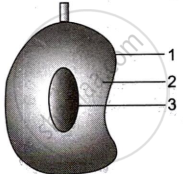
- Identify the parts labelled '1', '2' and '3'.
- State the difference between a true fruit and a false fruit.
- What is the significance of the formation of fruit in angiosperms?
Chapter: [0.012] Sexual Reproduction in Flowering Plants
Suneeta is planning an experiment to clone a gene in a vector. So, she has to choose a good cloning vector.
Which one of the vectors shown below should she choose? Justify your answer by giving two reasons.
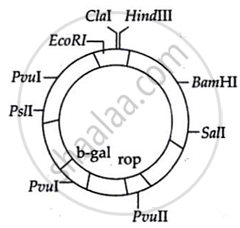 |
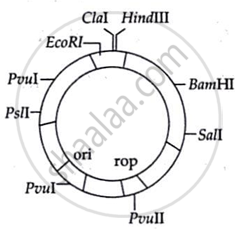 |
 |
| Vector A | Vector B | Vector C |
Chapter: [0.040999999999999995] Biotechnology - Principles and Processes
Study the two figures shown below that represent two growth models.
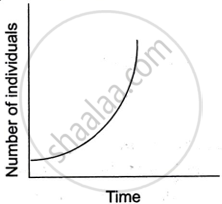 |
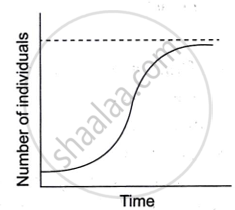 |
| Figure A | Figure B |
- Which one of the two figures represents an unlimited supply of nutrients? Give a reason.
- Which figure depicts a challenge to population growth?
- Explain the term reproductive fitness.
- Give the mathematical expressions for Figure A and Figure B.
Chapter: [0.051] Organisms and Populations
The diagram given below represents the schematic structure of proinsulin, which undergoes certain modifications before it becomes a fully functional insulin.
Study the diagram carefully and answer the questions that follow:
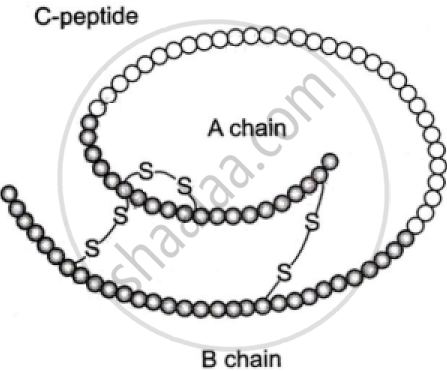
- State the change the proinsulin undergoes to become fully functional.
- Name the modern scientific technique used for the production of human insulin.
- How are the two polypeptide chains of the fully functional insulin held together?
Chapter: [0.042] Biotechnology and Its Applications
A patient was given an anti-retroviral drug by the doctor.
Which disease was the patient diagnosed with?
Chapter: [0.031] Human Health and Diseases
A patient was given an anti-retroviral drug by the doctor.
Mention any one symptom of HIV disease.
Chapter: [0.031] Human Health and Diseases
A patient was given an anti-retroviral drug by the doctor.
Give the scientific name of the causative agent of HIV disease
Chapter: [0.031] Human Health and Diseases
A patient was given an anti-retroviral drug by the doctor.
Which method was used to diagnose HIV disease?
Chapter: [0.031] Human Health and Diseases
A patient was given an anti-retroviral drug by the doctor.
What is the role of Reverse Transcriptase and Integrase in the life cycle of a retrovirus?
Chapter: [0.031] Human Health and Diseases
Draw a neat and well labelled diagram of T.S. of anther.
Chapter: [0.012] Sexual Reproduction in Flowering Plants
Draw a neat and well labelled diagram of T.S. of the mammalian ovary.
Chapter: [0.012] Sexual Reproduction in Flowering Plants
The table given below shows the Area, Y-intercept and regression coefficient of the continents namely, Africa and Europe. Study the table carefully and answer the questions that follow:
| Africa | Europe | |
| Area (A) | 62,000 km sq. | 65,000 km sq. |
| Y-intercept | (C) 10 | 20 |
| Regression coefficient (Z) |
1 | 1 |
- Calculate the species richness (S) of each continent.
- Which of these continents shows a higher biodiversity?
- State any two factors that cause an increase in biodiversity.
Chapter: [0.053] Biodiversity and Its Conservation
| Meena had grown Rose and China-rose plants in her garden. She collected pollen grains from China-rose plants and sprinkled them on the stigma of the Rose flowers, as she wanted to grow a hybrid variety of Rose. |
- Will this pollination give the desired results? Give a reason for your answer.
- What is geitonogamy? Why is it considered equivalent to cross-pollination in ecological context and self-pollination in genetic context?
Chapter: [0.012] Sexual Reproduction in Flowering Plants
| Fertilisation is the key process in sexually reproducing organisms and it acts as a vital link between two generations. Flowering plants adopt a unique pattern of sexual reproduction as compared to other organisms. |
- Explain the process of fertilisation in angiosperms.
- What is the precise location and function of filiform apparatus in the embryo sac of angiosperms?
- Fruits and seeds are generally formed due to fertilisation. Name the process involved in the production of the following without fertilisation:
- Fruits
- Seeds
Chapter: [0.011000000000000001] Reproduction in Organisms
The diagram given below shows the process of decomposition in the forest ecosystem.
Observe the diagram carefully and answer the questions that follow.
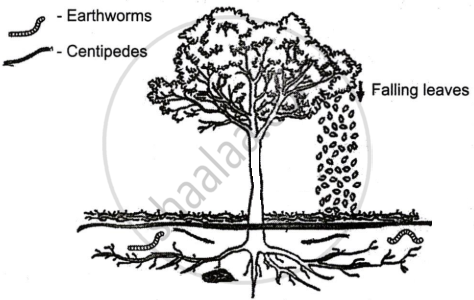
- Why is the breaking down of complex organic matter an important event in the ecosystem?
- The forest soil has a higher humus content than the desert soil. Give a reason to justify this statement.
- Earthworms and centipedes play an important role in the decomposition process of forest ecosystems. At which stage of the decomposition are these organisms involved?
-
The net annual primary productivity of a particular wetland ecosystem is found to be 8,000 kcal/m2 per year. If respiration by the aquatic producers is 11,000 kcal/m2 per year, calculate the gross primary productivity for this ecosystem.
Chapter: [0.052000000000000005] Ecosystem
Griffith conducted a series of experiments on mice with two different strains of the bacterium Diplococcus pneumoniae.
- Describe the entire procedure for this experiment.
- Write the conclusion of this experiment.
- What would have been the result of the experiment if both strains of bacteria were first heat-killed, mixed and then injected in the mice?
Chapter: [0.022000000000000002] Molecular Basis of Inheritance
Submit Question Paper
Help us maintain new question papers on Shaalaa.com, so we can continue to help studentsonly jpg, png and pdf files
CISCE previous year question papers ISC Class 12 Biology (Theory) with solutions 2023 - 2024
Previous year Question paper for CISCE ISC Class 12 -2024 is solved by experts. Solved question papers gives you the chance to check yourself after your mock test.
By referring the question paper Solutions for Biology (Theory), you can scale your preparation level and work on your weak areas. It will also help the candidates in developing the time-management skills. Practice makes perfect, and there is no better way to practice than to attempt previous year question paper solutions of CISCE ISC Class 12.
How CISCE ISC Class 12 Question Paper solutions Help Students ?
• Question paper solutions for Biology (Theory) will helps students to prepare for exam.
• Question paper with answer will boost students confidence in exam time and also give you an idea About the important questions and topics to be prepared for the board exam.
• For finding solution of question papers no need to refer so multiple sources like textbook or guides.
